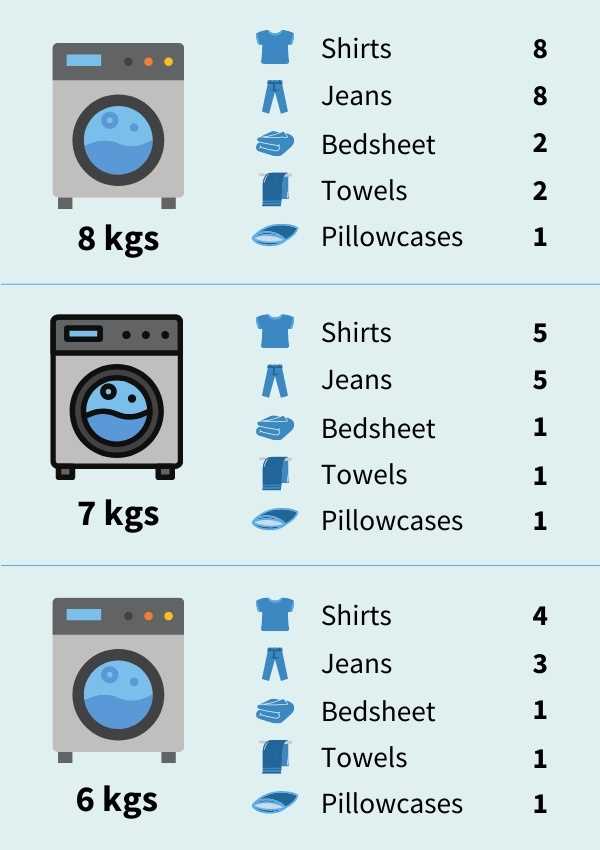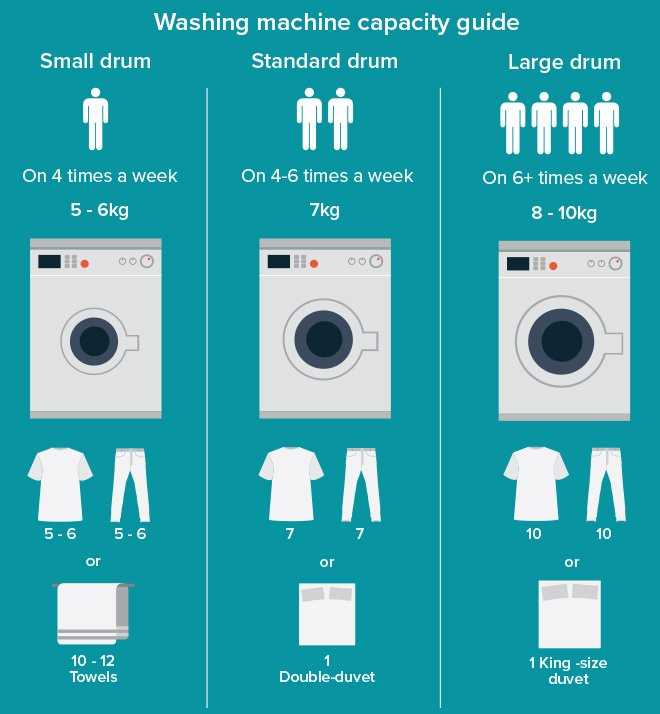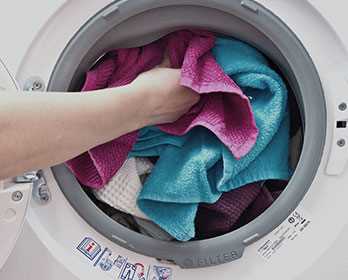




Doing laundry can often feel like a daunting task, especially if you’re unsure of how much your clothes weigh. Whether you’re a student living in a flat or a busy parent trying to juggle multiple loads, knowing the weight of your laundry can help streamline your routine and ensure you’re using the right amount of detergent and resources.
That’s where our Laundry Weight Calculator comes in. Designed specifically for those in the UK, our handy guide takes the guesswork out of laundry by providing easy-to-use conversion charts for common items of clothing.
Not only will our calculator save you time and money by preventing overloading your washing machine or using too much detergent, but it will also help you achieve cleaner and fresher clothes. By properly weighing your laundry, you can ensure that all your garments are thoroughly cleaned and that no residue or grime is left behind.
So whether you’re a laundry novice or an experienced launderer, our Laundry Weight Calculator is a must-have tool for simplifying your laundry routine. Say goodbye to guesswork and hello to a more efficient and effective way of doing laundry.
Calculate Laundry Weight
If you’re unsure about the weight of your laundry and need help calculating it, our Laundry Weight Calculator is here to simplify your laundry routine. By knowing the weight of your laundry, you can easily determine how much detergent to use and how long it will take to dry.
Step 1: Collect Your Laundry
Gather all your dirty laundry that you plan to wash in one load. This can include clothes, towels, bedding, and other fabrics.
Step 2: Weigh your Laundry
Using a bathroom scale or a dedicated laundry scale, weigh your collected laundry. Make sure to subtract the weight of any hampers or containers you used to carry the laundry.
Step 3: Record the Weight
Take note of the weight of your laundry. Our Laundry Weight Calculator uses kilograms (kg) as the standard unit of measure, so make sure to record the weight in kilograms.
Step 4: Use the Laundry Weight Calculator
Visit our Laundry Weight Calculator tool and input the weight of your laundry. The calculator will provide you with the recommended amount of detergent to use and an estimate of the drying time.
Step 5: Adjust as Needed

If you feel that the recommended amount of detergent is too much or too little based on your preferences or the cleanliness of your laundry, feel free to adjust the amount accordingly. Similarly, keep in mind that drying time may vary depending on the humidity, type of fabric, and the efficiency of your dryer.
By following these simple steps and using our Laundry Weight Calculator, you can take the guesswork out of your laundry routine, ensuring optimal cleaning and efficient drying.
Determine the Weight of Your Laundry for Effective Cleaning

Calculating the weight of your laundry is an essential step in ensuring effective cleaning results. By determining the weight of your laundry load, you can adjust the amount of detergent, water, and washing time accordingly, leading to cleaner and more efficient laundry cycles. Here are a few methods you can use to determine the weight of your laundry:
1. Weighing Scale
Using a weighing scale is the most accurate method to determine the weight of your laundry load. Place a clean and calibrated weighing scale on a flat surface. Gradually add the laundry items to the scale, ensuring that the weight remains within the scale’s capacity. Once all the items are on the scale, note down the total weight in kilograms.
2. Manufacturer’s Guidelines

Check the clothing tags for any weight indications provided by the manufacturer. Some clothing items may have weight specifications, especially if they are designed for specific sports or outdoor activities. These guidelines can give you an estimate of the weight of individual items or the entire load.
3. Visual Estimation
If you don’t have access to a scale or manufacturer’s guidelines, you can make a rough estimation of the weight based on visual cues. Familiarize yourself with the average weight of common laundry items such as t-shirts, jeans, and towels. By comparing the size and thickness of your laundry items to these standards, you can make an educated guess about the overall weight.
4. Laundry Load Examples
Here are some commonly found laundry items and their approximate weight:
- T-Shirt: 0.2 kg
- Jeans: 0.5 kg
- Dress: 0.4 kg
- Hoodie: 0.6 kg
- Towel: 0.8 kg
- Bedsheet: 1 kg
Using these examples as a reference, you can calculate the weight of your laundry load by adding up the estimated weights of individual items.
5. Laundry Weight Calculator
If you prefer a more precise method, you can use a laundry weight calculator. These online tools allow you to select the type and quantity of each item in your laundry load and provide you with an accurate weight estimation. Simply follow the instructions on the calculator and input the necessary information to determine the weight of your laundry.
By accurately determining the weight of your laundry load, you can optimize your laundry routine, save on detergent and water usage, and achieve cleaner and fresher clothes. Experiment with different methods to find the one that works best for you and improves your laundry experience.
Why Use a Laundry Weight Calculator
A laundry weight calculator can be a useful tool in your laundry routine. Here are a few reasons why you should consider using one:
- Accurate measurement: Using a laundry weight calculator ensures that you are accurately measuring the weight of your laundry. This is important because it helps you determine the appropriate amount of detergent and water to use for each load. A laundry weight calculator takes the guesswork out of this process, providing you with precise measurements.
- Time and cost savings: By using a laundry weight calculator, you can optimize the efficiency of your laundry routine. Knowing the exact weight of your laundry allows you to avoid overloading the washing machine, which can lead to poor cleaning results and potentially damage your clothes. It also helps you avoid underloading the machine, which wastes water and energy. Ultimately, these factors can save you time and money on your laundry tasks.
- Preserving clothing quality: Overloading your washing machine can cause excessive friction between the clothes, leading to wear and tear. By accurately measuring the weight of your laundry, you can ensure that your clothes have enough room to move freely in the machine, reducing the risk of damage. This helps to extend the lifespan of your clothing and keeps them looking newer for longer.
- Easy reference: A laundry weight calculator provides a handy reference tool that you can use whenever you need it. You can bookmark the calculator on your device or print out a copy to keep in your laundry area. This way, you can quickly and easily calculate the weight of your laundry before each wash, ensuring that you always have the right amount of detergent and water.
- Environmental impact: Overloading your washing machine not only affects the cleanliness and lifespan of your clothing, but it also has environmental consequences. When the machine is overloaded, the clothes do not have enough space to move freely, and the water and detergent may not be distributed evenly. This can result in inefficient cleaning and a waste of resources. A laundry weight calculator helps you optimize your laundry process, reducing water and detergent waste, and minimizing your environmental footprint.
Overall, using a laundry weight calculator can simplify your laundry routine, save you time and money, preserve the quality of your clothing, provide a convenient reference tool, and reduce your environmental impact. Consider incorporating a laundry weight calculator into your laundry routine to streamline your washing process and achieve better results.
The Benefits of Knowing the Weight of Your Laundry

- Better Laundry Management: Knowing the weight of your laundry can help you manage your laundry tasks more efficiently. By knowing the weight, you can better plan and allocate your laundry time and resources.
- Proper Detergent Usage: The weight of your laundry can help you determine the appropriate amount of detergent to use. Using too little detergent may not effectively clean your clothes, while using too much can waste detergent and cause residue buildup.
- Optimal Load Size: Determining the weight of your laundry can help you determine the optimal load size for your washing machine. Overloading the machine can lead to poor cleaning and potential damage, while underloading can waste water and energy.
- Effective Stain Removal: Different stains may require different pre-treatment or stain removal methods. Knowing the weight of your laundry can help you gauge the intensity of the stains and choose the appropriate stain remover or pre-treatment method.
- Energy and Water Conservation: Understanding the weight of your laundry can help you optimize water and energy usage. By accurately loading your washing machine, you can prevent unnecessary water and energy waste, helping to reduce your environmental footprint.
Overall, knowing the weight of your laundry offers several benefits, including better laundry management, proper detergent usage, optimal load size, effective stain removal, and energy and water conservation. By utilizing a laundry weight calculator, you can simplify your laundry routine and make more informed decisions for cleaner and more efficient laundry care.
How to Use the Laundry Weight Calculator
Using the Laundry Weight Calculator is simple and straightforward. Just follow these easy steps:
- Start by gathering all the laundry you wish to weigh. This includes clothes, towels, beddings, and any other items you plan to launder.
- Once you have all the laundry ready, place it on a flat surface like a table or a clean floor.
- Using a scale, weigh each item individually. Make sure to remove any accessories or additional items such as button covers or belts that might add unnecessary weight.
- As you weigh each item, write down the weight in either kilograms (kg) or pounds (lbs) depending on your personal preference.
- Once you have weighed all the items, add up the individual weights to get the total weight of your laundry load.
- Now, go to our Laundry Weight Calculator tool on our website and enter the total weight of your laundry load.
- The calculator will provide you with the recommended amount of laundry detergent to use based on the weight of your load. This will help you avoid using too much or too little detergent, ensuring effective cleaning while saving money.
- Follow the detergent manufacturer’s instructions for using the recommended amount of detergent and proceed with washing your laundry as usual.
By using the Laundry Weight Calculator, you can optimize your laundry routine and ensure that you are using the right amount of detergent for each load. This will help you achieve cleaner and fresher laundry while prolonging the life of your clothes.
Step-by-Step Guide to Calculate Your Laundry Weight
Calculating your laundry weight can help you determine the appropriate amount of detergent to use and ensure that you do not overload your washing machine. Follow these steps to calculate your laundry weight:
- Gather your laundry: Collect all the clothes and other items that you plan to wash.
- Weigh your laundry basket: Use a bathroom scale or a kitchen scale to weigh your empty laundry basket. Make a note of the weight in kilograms.
- Add your laundry: Place the laundry that you gathered in step 1 into the basket.
- Weigh your loaded basket: Weigh the laundry basket with the added laundry. Make a note of the weight in kilograms.
- Calculate the laundry weight: Subtract the weight of the empty laundry basket (step 2) from the weight of the loaded basket (step 4) to determine the weight of your laundry.
For example, if the weight of the loaded basket is 5 kilograms and the weight of the empty basket is 1 kilogram, the weight of your laundry would be 4 kilograms (5 kilograms – 1 kilogram).
Remember that this calculation is an estimate, and the actual weight of your laundry may vary slightly. It is also important to check the capacity of your washing machine to ensure that you do not overload it.
Using the Laundry Weight Calculator in combination with this step-by-step guide can simplify your laundry routine and ensure that you achieve optimal results with every wash.
Tips for Efficient Laundry Routine
1. Sort your laundry

Before starting your laundry, it’s important to sort your clothes properly. Sort them by color and fabric type to prevent any damage or color bleeding. This will also make it easier to load your washing machine.
2. Follow the care labels
Pay attention to the care labels on your clothes and follow them accordingly. This will ensure that your clothes are being washed at the appropriate temperature and with the correct cycle.
3. Pre-treat stains
If you have any stains on your clothes, it’s important to pre-treat them before washing. Use a stain remover or simply apply some detergent directly to the stain and let it sit for a few minutes before washing.
4. Use the right amount of detergent
Using too much detergent can leave residue on your clothes and can also be wasteful. Use the recommended amount of detergent for each wash load to ensure clean and fresh-smelling clothes.
5. Consider using fabric softener
Fabric softener can make your clothes feel softer and can also help reduce static cling. However, be mindful of using too much, as it can leave a sticky residue on your clothes. Follow the instructions on the fabric softener bottle for the correct amount.
6. Don’t overload the washing machine
Overloading the washing machine can prevent the clothes from getting properly cleaned. Be mindful of the capacity of your washing machine and avoid cramming too many clothes into each load.
7. Hang dry when possible
To conserve energy and prolong the life of your clothes, consider hang drying them whenever possible. This can also help prevent shrinking or damage caused by the dryer.
8. Fold or hang your clothes immediately
After removing your clothes from the dryer or from the clothesline, fold or hang them immediately to prevent wrinkles. This will save time and effort when it comes to ironing.
9. Clean your washing machine regularly

To ensure that your washing machine is working efficiently, it’s important to clean it regularly. Follow the manufacturer’s instructions for cleaning and maintenance to prevent any build-up or unpleasant odors.
10. Use a laundry weight calculator
To simplify your laundry routine and ensure you’re not overloading your washing machine, use a laundry weight calculator. This will help you determine the weight of your laundry and guide you in loading the appropriate amount each time.
11. Consider using eco-friendly laundry products
If you’re looking to reduce your environmental impact, consider using eco-friendly laundry products. Look for detergents and fabric softeners that are labeled as environmentally friendly or biodegradable.
12. Empty the lint filter
After each load, remember to empty the lint filter in your dryer. This will not only improve the dryer’s efficiency but also reduce the risk of a fire hazard.
13. Repurpose old clothes
If you have clothes that are no longer wearable, consider repurposing them instead of throwing them away. You can turn old t-shirts into cleaning rags or use them for DIY projects.
14. Use a laundry schedule
Creating a laundry schedule can help you stay on top of your laundry routine and prevent it from becoming overwhelming. Set specific days for doing laundry and stick to the schedule to maintain an efficient routine.
15. Teach children to help

Get your children involved in the laundry routine by teaching them how to sort clothes, fold, and put them away. This can help lighten your load and also teach them important life skills.
FAQ
How does the laundry weight calculator work?
The laundry weight calculator works by providing you with a guide to the weight of different types of laundry items in kilograms. You simply select the items you have and the calculator will give you an estimate of the combined weight.
Can I use the laundry weight calculator for any type of laundry?
Yes, the laundry weight calculator can be used for a wide variety of laundry items, including clothing, bedding, towels, and more. You can select the specific items you have and the calculator will provide an estimate of their combined weight.
Is the laundry weight calculator only for use in the UK?
No, the laundry weight calculator can be used by anyone, regardless of their location. While the measurements are given in kilograms, you can still use the calculator to estimate the weight of your laundry items regardless of where you are in the world.
What if I have a large load of laundry?
If you have a large load of laundry, you can simply select the items you have and the calculator will provide an estimate of their combined weight. If the weight exceeds the recommended capacity of your washing machine, you may need to split the load into multiple cycles.
Can I use the laundry weight calculator on my phone?
Yes, the laundry weight calculator can be accessed on your phone or any other device with an internet connection. Simply visit the website or use the mobile app to access the calculator and input your laundry items.
How do I use the Laundry Weight Calculator?
To use the Laundry Weight Calculator, simply enter the number of each type of clothing item you have and the calculator will estimate the total weight in kilograms. This will help you determine how much detergent you need and how long the wash cycle will take.











